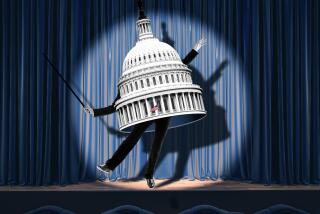NEWS ANALYSIS : NEA Compromise Still Troubles Artists : Congress: The measure passed by the House is no arts manifesto. It requires ‘decency’ in endowment-funded projects.
- Share via
WASHINGTON — A mood between fatigued relief and euphoria dominated the arts community Friday in the wake of the astonishing ease and force with which conservative advocates of harsh restrictions on the National Endowment for the Arts were routed in votes in the House.
But the emotions obscured a series of lingering questions about potentially controversial provisions of the NEA reauthorization bill. The measure would extend the life of the NEA for three years and ostensibly exercise no content control over work the endowment supports, except for a provision barring use of NEA funds for works deemed obscene by a criminal court.
The House outcome left many arts community members with mixed emotions. The bill may be characterized as the most permissive legislation artists could have hoped for, but significantly short of the freedom they enjoy under the present NEA enabling law, which expired on Sept. 30. Beyond question, the bill is in almost no sense an arts manifesto and in nearly all aspects a document that represents political compromise.
John Buchanan, a Baptist minister and former congressman who now heads the liberal People for the American Way organization, praised the House outcome--but primarily because of how bad things might have gotten. “Measured against what might have happened and what a few months ago seemed even likely to happen,” said Buchanan of the NEA’s months-long travails, “this is a decisive victory for the arts and for freedom of expression.”
But in objective terms, Buchanan said, the House measure still poses some problems for artists. “The bill I would have written,” he said, “would have had no restrictive language of any kind.”
“It’s just sad and tragic,” said Charlotte Murphy, executive director of the National Assn. of Artist Organizations and a founder of the National Campaign for Freedom of Expression, “but the American public’s ability to view art and form their own opinions is going to be diminished. There are really intimidations . . . a whole series of (new) internal procedures that deter museums, theaters and other presenters from supporting innovative work.”
Although the House actions, which continued Friday with debate on a separate measure to appropriate $180 million for the NEA for 1991, went a long way toward resolution of the 15-month crisis at the arts endowment, a close reading of the compromise authorization bill approved Thursday night shows it includes major changes in the way NEA grants will be sought and made.
Friday’s debate was cut short by a bipartisan agreement to adjourn. The House session ended before discussion of a proposal to add the text of the authorization bill passed Thursday night to the pending money bill, containing the $180 million earmarked for the NEA. Debate is expected to resume next week.
Moreover, some arts supporters fret that one paragraph buried deep in the bill could turn out to be, in the words of Washington arts lawyer James Fitzpatrick, “a constitutional ticking time bomb” waiting for exploitation by people who seek to limit the range of subject matter perceived as appropriate for NEA support. Arts advocates, including Rosalind Wyman, the former Los Angeles City Council member who served on a congressional NEA task force last summer, voiced subdued alarm about the provision.
The sponsors of the House NEA bill, Reps. Pat Williams (D-Mont.) and Tom Coleman (R-Mo.), sought Thursday night to sooth those concerns. Both men seemed clearly eager to head off any new protest from an arts community that has spent the last year under siege. Even if Williams and Coleman succeed in assuaging these doubts, however, it is clear that artists and arts organizations will find major changes in their relationship with the arts endowment--perhaps with funds tighter than ever for support to individual artists and smaller, cutting-edge organizations.
Artists and arts activists spent much of the week before Thursday’s House votes consolidating their concerns. The demise of the arts endowment had seemed possible, given the concerted conservative assault on it. A degree of alarm bordering on panic had set in among major arts advocacy organizations Wednesday night as worry about the potential effects of the Williams-Coleman bill spread. By Friday, the panic had turned to surprised, if cautious, relief.
The arts community was most concerned about a paragraph in a section of the Williams-Coleman bill that bars the funding of obscene work and leaves the test of obscenity up to criminal courts--with decisions not binding on the NEA until conclusion of all appeal proceedings. In the same section, however, the legislation instructs the NEA chairman to promulgate regulations that “ensure” that artistic excellence and merit are the criteria by which NEA grants are given. But it also requires that NEA regulations take “into consideration general standards of decency and respect for the diverse beliefs and values of the American public.”
In the House on Friday, Rep. Ted Weiss (D-N.Y.) assailed the decency-related standard. “I don’t know what that means,” Weiss complained. “It is just a totally unconstitutional provision.”
Fitzpatrick had been the first--but, as the week went on, far from the last--arts observer to voice alarm at the potential implications of the wording. He and Wyman argued that the language could be set upon by NEA opponents intent on challenging a diverse array of government-funded art.
Williams and Coleman sought to mollify the critics in comments Thursday night after the House victory. Coleman said the wording had been included as part of a delicate political balancing act in which he and Williams brought several House members together. The decency paragraph, he said, had been fashioned to appeal to Rep. Paul Henry (R-Mich.), a former college professor with increasing influence in the politics of art issues.
The wording in the final bill, Coleman said, was strictly the product of making Henry an offer he would accept on decency that would not sell artists out. The final wording, Coleman and Williams said, is probably ambiguous enough to defy employment as a political-legal bludgeon. “It is somewhat less (stringent) than (saying the NEA chairman) shall do this,” Coleman said. Williams said that he was sensitive to Fitzpatrick’s criticism, but “it’s like in music where some notes can be read as sharps or flats. Jim (Fitzpatrick) has chosen to read it as a sharp. It can also be read as a flat.”
The NEA reauthorization bill pending in the Senate is different in many respects from the Williams-Coleman measure. If a Senate version passes, most observers believe that a conference committee will end up tempering many of the potentially controversial aspects of the House legislation. For that reason, many arts observers were content, by Thursday night and Friday morning, to take their victory and wait.
Potentially controversial provisions in the House NEA bill, should they make it to the final version of a join House-Senate bill include:
* Reallocation of some funds to state arts councils: The bill backed away from a plan--originally championed by Coleman and Rep. Steve Gunderson (R-Wis.) to redistribute the NEA budget and give state arts councils 60% of the money. The Williams-Coleman bill would reallocate as much as 35% to the states. Arts community observers have been voicing concerns for more than a week that the practical effect would be to rob money from grants now made to individual artists and cutting-edge organizations.
* Artworks judged “obscene”: For the first time, there are defined penalties for artists whose work is judged by a criminal court to be obscene. The penalties were decreased from the original proposal under an amendment sponsored by Rep. Fred Grandy (R-Iowa), a former actor on the television series “The Love Boat.” The original bill would have forced artists to pay back their grants and be ineligible for new funding for three years. The Grandy amendment knocked the penalty back to repayment only.
* Application procedures: Artists and arts groups will find NEA application procedures significantly more difficult and cumbersome. They will be forced to describe work they propose in much greater detail than ever before. They will have to file interim reports on progress of the work as it is created and provide much more detailed final documentation. Grants will be paid in increments to give the NEA greater control over work that may differ from what the application describes.
* Grant-review panel procedures: There will be a crackdown on NEA grant-review panel procedures, with significantly greater participation by non-artists. Panels will be legally barred from including members who also have grants pending before the NEA.
The non-artist provision has been the subject of recent internal briefings by NEA Chairman John E. Frohnmayer. As endowment program directors looked on with alarm one day about three weeks ago, for instance, Frohnmayer--according to people present at the meeting--gave an example of things to come.
“I’m going to get a truck driver who likes country music,” Frohnmayer said, “and put him on the folk-arts panel.”
NEXT STEP
Legislation to reauthorize and appropriate money for the National Endowment for the Arts next goes to the Senate--possibly next week. However, the deluge of budget- and tax-related bills pending in the Senate may mean that the NEA reauthorization act will not be taken up. In that case, formal reauthorization would have to await the convening of the new Congress in January. The appropriations bill will be acted on by the Senate; it would become the sole law governing the arts endowment if reauthorization is not completed. The House is also expected to resume debate on the NEA’s 1991 appropriation bill.
More to Read
The biggest entertainment stories
Get our big stories about Hollywood, film, television, music, arts, culture and more right in your inbox as soon as they publish.
You may occasionally receive promotional content from the Los Angeles Times.










